I am simply trying to initialize an object inside a list via a JPA query. Been unsuccessful in my 1 1/2 day journey thus far.
public interface Po_partRepository extends JpaRepository<Po_part, Long> {
@Query(value = "SELECT " + "po.id po_id," + "po.po_number po_number,"
+ "po.due_date po_due_date," + "po_part.id po_part_id,"
+ "po_part.part_quantity part_quantity," + "part.id part_id,"
+ "part.part_number part_number,"
+ "part.part_description part_description,"
+ "part.plasma_hrs_per_part plasma_hrs,"
+ "part.grind_hrs_per_part grind_hrs,"
+ "part.mill_hrs_per_part mill_hrs,"
+ "part.brakepress_hrs_per_part brakepress_hrs "
+ "FROM hillcresttooldie.t_po po "
+ "join hillcresttooldie.t_po_part po_part "
+ "on po_part.po_id = po.id " + "join hillcresttooldie.t_part part "
+ "on part.id = po_part.part_id;", nativeQuery = true)
List<Shop_Orders> getShopOrders(); }
Shop_Orders Model
@Entity
@Table(name = "SHOP_ORDERS")
@Cache(usage = CacheConcurrencyStrategy.NONSTRICT_READ_WRITE)
public class Shop_Orders implements Serializable {
/**
*
*/
private static final long serialVersionUID = 799464578815300087L;
@Id
@GeneratedValue(strategy = GenerationType.AUTO)
private int shop_order_id;
@Column(name = "po_id")
private int po_id;
@Column(name = "po_number")
private int po_number;
@Column(name = "po_date")
private Date po_due_date;
@Column(name = "part_quanity")
private int part_quanity;
@Column(name = "part_id")
private int part_id;
@Column(name = "part_description")
private String part_description;
@Column(name = "plasma_hrs")
private int plasma_hrs;
@Column(name = "grind_hrs")
private int grind_hrs;
@Column(name = "mill_hrs")
private int mill_hrs;
@Column(name = "breakpress_hrs")
private int breakpress_hrs;
public Shop_Orders() {
}
public int getPo_id() {
return po_id;
}
I created table for shop_orders:
Here is an example of what I would like to do once query is ran and the object is set in the list.
Shop_Orders shopOrders;
int poNumber = shopOrders.getPo_number();
However I keep getting the following error when I run the query
[ERROR] com.htd.aop.logging.LoggingAspect - Exception in
com.htd.web.rest.Po_partResource.getAll() with cause = null
java.lang.ClassCastException: [Ljava.lang.Object; cannot be cast to
com.htd.repository.Shop_Orders
at com.htd.web.rest.Po_partResource.getAll(Po_partResource.java:85) ~
[classes/:na]
I will post snippets of Po.java and Part.java in case someone wants to look at them.
/**
* A Po.
*/
@Entity
@Table(name = "T_PO")
@Cache(usage = CacheConcurrencyStrategy.NONSTRICT_READ_WRITE)
public class Po implements Serializable {
private static final long serialVersionUID = 1L;
@Id
@GeneratedValue(strategy = GenerationType.AUTO)
private Long id;
@Column(name = "po_number")
private String po_number;
part.java
/**
* A Part.
*/
@Entity
@Table(name = "T_PART")
@Cache(usage = CacheConcurrencyStrategy.NONSTRICT_READ_WRITE)
public class Part implements Serializable {
@Id
@GeneratedValue(strategy = GenerationType.AUTO)
private Long id;
@Column(name = "part_number")
private String part_number;
Thanks for the advice ahead of time.